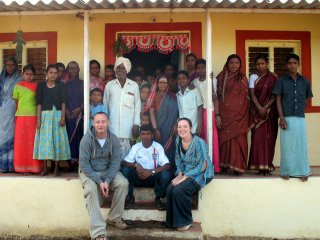
In my guesthouse works the wonderful 18 years Manju.
Manju comes from a village in Karnataka (another district in India), 10 hours from Palulme, Goa. He is the main supporter of his family, and has started working when he was 10 years old. Without knowing how to read or write, he speaks 5 languages and is an excellent businessman. When talking to him you can easily see the good hart of this young man.
From the moment I met Manju, we made a connection, and spent about half an hour every day talking. Manju has invited me to come with him to a Hindu festival in his small village, and I willingly accepted, taking Neil with me as a chaperon. And so it happened, that from the 26th of December till the 29th, I spent the most incredible time with Neil, Manju and Manju’s family. This picture was taken on our way to the village (we exchanged about 5 local buses).
Some general details:
The festival we attended occurs once every 3 years, and no white person has ever attended it. In fact, according to Manju- no white person has ever visited his village (and we could certainly feel it from the attention we drew). Therefore, there were no hotels or restaurants in the village, and no other appropriate services. For 3 nights we stayed at Manju’s home with his extended family (many people from his family, who live in other villages, have come to celebrate the festival). We ate with them the same food, used the same toilets (the un-existing ones…) spend time with them and joined the religious ceremonies.
An unforgettable, unique and wonderful experience!

 Just before leaving, we took this photograph with mixed emotions. It was time to say goodbye, but very hard as well.
Just before leaving, we took this photograph with mixed emotions. It was time to say goodbye, but very hard as well. 
 After the big ceremony in the village, Manju’s younger sister paints on my hand with hina, then dresses me up together with her older sister in traditional Sarri (including earrings, necklace and flowers in my hear) and finally they make this short ritual where they pass some kind of leaves around my body and then through it into the fire, against the gossips of jealous people (A’in Hara’a). Lots of fun indeed.
After the big ceremony in the village, Manju’s younger sister paints on my hand with hina, then dresses me up together with her older sister in traditional Sarri (including earrings, necklace and flowers in my hear) and finally they make this short ritual where they pass some kind of leaves around my body and then through it into the fire, against the gossips of jealous people (A’in Hara’a). Lots of fun indeed. 
 The second ceremony we attended, at the 3rd day, involved the whole village. People gathered around the temple at 5 o’clock in the morning, in order to see and participate in the slaughtering of a cow, as a sacrifice for the village’s goddess. Many people went on top of the roofs in order to see the slaughtering. Manju was given the role of holding the Macheta (like other men who are head of the family) as part of the ceremony, and therefore could not join me and Neil. The younger sister again took upon herself the role of our guardian/ nanny, and took good care of us. We went on top of the temples’ roof, and watched the whole thing from up there. For 2 hours people where throwing chickens in the air, slaughtering goats, men run with swords in their hands, and a man from the temple was shouting through the microphone. As the only outsiders, we drew a lot of attention from the villagers. A real genuine experience...
The second ceremony we attended, at the 3rd day, involved the whole village. People gathered around the temple at 5 o’clock in the morning, in order to see and participate in the slaughtering of a cow, as a sacrifice for the village’s goddess. Many people went on top of the roofs in order to see the slaughtering. Manju was given the role of holding the Macheta (like other men who are head of the family) as part of the ceremony, and therefore could not join me and Neil. The younger sister again took upon herself the role of our guardian/ nanny, and took good care of us. We went on top of the temples’ roof, and watched the whole thing from up there. For 2 hours people where throwing chickens in the air, slaughtering goats, men run with swords in their hands, and a man from the temple was shouting through the microphone. As the only outsiders, we drew a lot of attention from the villagers. A real genuine experience... 
 The first religious ceremony took place at the second morning of our arrival. Manju and his mother were taken to the nearest tap (as they don’t have running water in the house), escorted by the rest of the family. One of the relatives scattered water all over their bodies in order to purify them. The family put flowers on the tap and sang a specific mantra.
The first religious ceremony took place at the second morning of our arrival. Manju and his mother were taken to the nearest tap (as they don’t have running water in the house), escorted by the rest of the family. One of the relatives scattered water all over their bodies in order to purify them. The family put flowers on the tap and sang a specific mantra.
 In my guesthouse works the wonderful 18 years Manju.
In my guesthouse works the wonderful 18 years Manju.